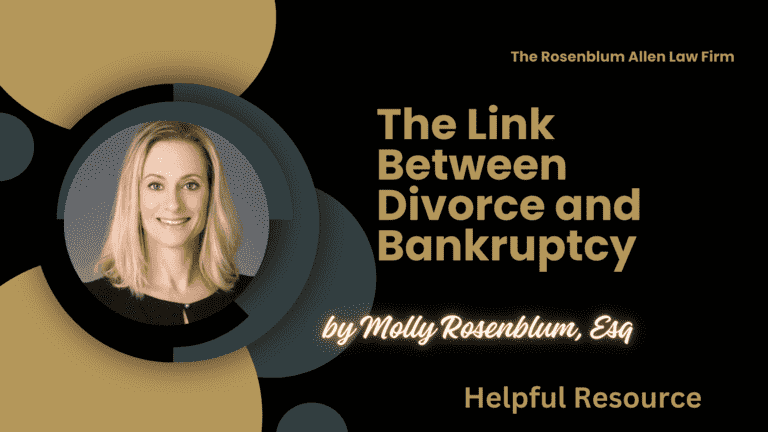Understanding Divorce and Money Troubles in Nevada
How Splitting Up Can Lead to Money Problems
If you live in Nevada and you’re thinking about getting a divorce, it’s essential to know that when people stop being married, they might also have trouble with money.
This can be so serious that they might think about Bankruptcy.
Bankruptcy is when you tell the government you can’t pay your bills and need help to start over.

Divorce Can Be Expensive
When two people decide to get a divorce, they have to figure out who gets what. This includes the house, cars, money, and everything else they own. Sometimes, they also have to decide how to care for their kids. This can cost a lot of money because they might need to pay for lawyers and court fees.
Money Stress After Divorce
After the divorce, each person has to live on their own money instead of putting it together. This can be hard because the bills they used to pay together aren’t cut in half because they’re now divorced. Each person might have less money to spend but the same amount of bills or more.
Why Some People Choose Bankruptcy
Sometimes, the money problems after a divorce get so big that people can’t fix them alone. They might choose bankruptcy to get help.
Bankruptcy can make some of their bills go away or give them a plan to pay over time. But it’s a big decision because it can also make it harder to borrow money in the future, like for a car or a house.
Getting Help in Nevada
If you’re in Las Vegas thinking about divorce and are worried about money, you should talk to someone who knows much about the law. The Rosenblum Allen Law Firm helps people get divorced and can speak to you about your money problems. They know how to help people worried about bankruptcy after a divorce.

The Cost of Getting Divorced
Divorcing in Nevada isn’t just about signing papers. You might need to hire a divorce attorney to protect your interests, which can be costly. The legal process includes court fees, and the costs can increase quickly if there’s a disagreement on how to split property or custody. These expenses can drain savings accounts and may lead to debt accumulation.
Living on a Single Income
After a divorce, you must manage your household on a single income. This transition can be challenging, mainly if one spouse is not working or earning significantly less.
Adjusting to a new budget can be difficult, and the financial strain can lead to missed payments on mortgages, credit cards, or other debts.
Dividing Debts and Assets
Nevada is a community property state, meaning any debts and assets acquired during the marriage are considered joint property and will be divided equally in a divorce. This could result in each person taking on a portion of the marital debt they may struggle to pay off independently.
Impact on Credit Scores
Divorce can directly impact credit scores. If your ex-spouse doesn’t pay debts they were responsible for, it could affect your credit score negatively, making it harder to get loans or new credit lines. This financial strain can lead to considering bankruptcy as a solution.
The Role of Bankruptcy
For some, bankruptcy might seem the only option to manage their post-divorce financial crisis.
It can help by discharging certain debts or restructuring debts into a more manageable payment plan.
However, bankruptcy has long-term consequences, including a significant impact on your credit score and the ability to get credit in the future.
How The Rosenblum Allen Law Firm Can Help
The Rosenblum Allen Law Firm understands the intricacies of both divorce and bankruptcy law in Nevada. Seeking their advice can provide multiple benefits:
- Legal Expertise in Divorce: They can guide you through divorce, help negotiate fair settlements, and protect your financial interests.
- Financial Advice: They can advise on how to separate best and manage debts and assets to avoid future financial hardship.
- Bankruptcy Attorney Referral: If bankruptcy is being considered, they can explain the different types (such as Chapter 7 or Chapter 13) and their implications. They can then refer you to an attorney to help you file for bankruptcy.
- Preventative Planning: They can assist in planning for post-divorce financial stability, helping you to avoid bankruptcy if possible.

Breaking It All Down for You
Divorce is a new beginning, and while it may come with financial challenges, understanding your options is crucial.
By working with a law firm that knows Nevadans’ challenges when dealing with divorce, you can navigate this difficult time with more confidence and less financial uncertainty.
The Rosenblum Allen Law Firm can be your ally in this process, offering the support and guidance you need to move forward.

Frequently Asked Questions
What should I do first if I’m considering divorce and am worried about my finances?
Start by evaluating your financial situation. Gather all financial documents and consult with a divorce attorney to understand the financial implications of divorce and plan for your financial security.
How can I manage my debt after a divorce?
After divorce, reassess your budget, prioritize debts, negotiate payment plans with creditors, cut unnecessary expenses, and seek financial counseling if needed to create a manageable budget.
How can I protect my credit score during a divorce?
To safeguard your credit score:
- Continue making payments on time.
- Regularly monitor your credit report for inaccuracies or fraudulent activity.
- Separate or close joint accounts to prevent your ex-spouse’s actions from impacting your credit.
If my ex-spouse files for bankruptcy after our divorce, will that affect me?
If you have joint debts included in your ex-spouse’s bankruptcy, creditors may seek payment from you. Ensure your divorce settlement includes protections against this scenario and consult with your attorney for guidance.
What is the best way to handle joint accounts during a divorce?
Ideally, close or divide joint accounts to prevent further joint debt. If closure isn’t possible, remove authorization for your spouse to use the account and document these changes and agreements.
Can The Rosenblum Allen Law Firm refer me to a bankruptcy attorney if needed?
While not handling bankruptcy cases directly, The Rosenblum Allen Law Firm can provide referrals to reputable bankruptcy attorneys in Las Vegas and work with your chosen attorney to ensure your divorce settlement considers your bankruptcy proceedings.
What happens to our home if we can’t afford the mortgage after divorce?
Options may include selling the home and splitting proceeds, one spouse keeping the home and refinancing the mortgage, or allowing foreclosure. Discuss these options with your attorney to understand their financial implications.
How can I make the right financial decisions during my divorce?
Work with a divorce attorney and financial planner. Your attorney can navigate legal aspects, while a financial planner can assist with long-term planning and immediate budget concerns.
Will I have to pay my spouse’s debt after divorce?
In Nevada, as a community property state, you may be responsible for debts incurred during the marriage, even if not in your name. However, this can be negotiated during the divorce process with guidance from your attorney.

Additional Resources for You
It’s important for our readers to remember that our esteemed lead attorney, Molly Rosenblum Allen, Esq., has developed a wide array of resources designed to support and guide you through challenging times. Here’s a reminder of the valuable resources available:
Las Vegas Divorce Attorney: Expert legal advice and support for those undergoing divorce in Las Vegas. Explore More
Alimony in Nevada: Crucial information about alimony laws and what you can expect in the state of Nevada. Learn More
Divorce and Mortgage: Navigate the complexities of handling your mortgage during a divorce with this insightful guide. Get Informed
Divorce and Taxes: Understand the tax implications of divorce and how to manage them effectively. Know Your Taxes
Health Insurance After Divorce: Essential information on how to manage your health insurance needs following a divorce. Stay Covered
Student Loan Debt Divorce: Learn how student loan debt is handled and divided in a divorce. Understand Your Debt
How Much is Alimony in Nevada?: Get insights into the factors that determine alimony amounts in Nevada. Calculate Alimony
Divorce Attorney Fee: Understanding the costs associated with hiring a divorce attorney can help you plan your finances better. Plan Your Budget
Who Gets the House in a Divorce in Nevada: Find out how property, including your home, is divided in a Nevada divorce. Know Your Rights
How to Not Get Screwed in a Divorce: Arm yourself with knowledge and strategies to protect your interests during a divorce. Protect Yourself
Molly Rosenblum Allen, Esq., is dedicated to providing comprehensive support and expert legal advice. We encourage you to take advantage of these resources to guide you through your legal journey.

Offsite Resources You May Find Helpful
Aside from the resources provided by the Rosenblum Allen Law Firm, individuals seeking further information on divorce, annulment, and related legal matters may find the following offsite resources useful:
American Bar Association: A premier source for legal resources, including articles and public education related to family law.
National Center for State Courts: Offers resources and information pertaining to the court systems, which can be helpful for understanding the legal process of divorce or annulment.
Legal Information Institute at Cornell Law School: Provides free access to American legal information, including family law which encompasses divorce and custody laws.
FindLaw: A comprehensive resource for legal information, including a section on family law that covers divorce and related topics.
DivorceNet by Nolo: Offers articles, FAQs, and resources on divorce, child custody, alimony, and other family law issues.
The National Domestic Violence Hotline: Offers support and resources for those who are experiencing domestic abuse, which can be an aspect of divorce or separation situations.
Each of these resources provides a wealth of information that can be helpful for individuals going through the divorce process, dealing with custody issues, or seeking annulments.

A Special Message From Our Lead Attorney

Molly Rosenblum, Esq
Dear Readers,
Thank you for taking the time to engage with our divorce resources. I hope you have found them informative and helpful as you navigate through what can be a complex and emotional time. Understanding the nuances of divorce and family law is crucial to making informed decisions about your future.
If you feel ready to discuss your situation further and see how my team and I can assist you, please do not hesitate to call us at (702) 433-2889. We are committed to providing the support and legal guidance you need to move forward.
Warm regards,
Molly Rosenblum, Esq.



